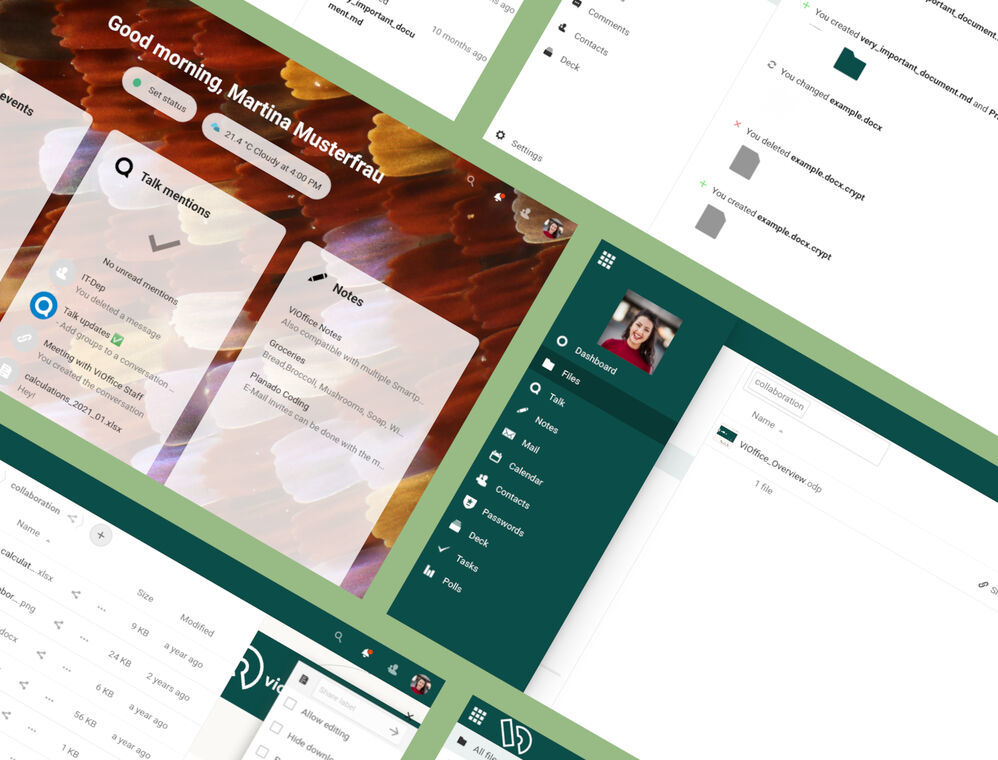Free, open source software is something we encounter in everyday life all the time. Not only do individual open source software projects find their way to us, but there are also numerous large (and small) companies that develop and commercially distribute open source software with great success, such as Red Hat, Nextcloud or our partners at Collabora Office. In this blog post we would like to introduce you to the most successful business models for Free Open Source Software.
Open Source & Business – A Contradiction?

Whether the Mozilla Firefox browser, the Android smartphone operating system or the VLC multimedia player – they are all based at their core or even entirely on Free Software. Almost all known software projects contain at least partial open source components. Surveys also show that over 70 percent of companies in Germany rely on open source software, and among large companies with over 2,000 employees, the proportion is even significantly higher at just under 90 percent.
However, open source or the complete disclosure of source codes is not “only” a theoretical ideal that is implemented out of ethical considerations, but offers very practical advantages for our society, consumers and even companies.
The open source code is subject to public control through a permanent public audit and can always be improved by everyone to increase functionality and security. Thus, free, open source software is usually more secure than proprietary alternatives. This fact is not only relevant with regard to data protection aspects, but there is also a targeted demand for open source products that can be met by open source companies.
In addition, it is clear from an economic point of view that the overall benefit to society is highest when several companies compete with each other. Such a competitive situation means that individual companies do not have too much control over the market and prices can be formed freely. In the digital economy in particular, this principle is violated by the formation of monopolies, and individual companies gain market power and thus global influence, which ultimately harms society. Open source counteracts this, as the so-called vendor lock-in, which makes it difficult to switch to other software or other providers at a later date, is avoided. In addition, companies save significantly on development costs by using free, open source software. Thus, consumers, producers and the entire society benefit from the use and development of Free Open Source Software for many reasons.
Open Source Business Models at a Glance

Having already written a few articles on the social aspects of open source, we would like to take a more entrepreneurial perspective here and introduce you to various business models. Of course, the individual approaches are not mutually exclusive, but can be pursued in parallel by individual companies.
1. Distribution of Training, Support & Consulting
Probably the most common approach is the distribution of commercial services around the corresponding open source software. Specifically, companies can offer training, technical support or consulting as a paid service for the distributed software. Thus, companies do not earn from the distribution of the software itself, but from the services they offer commercially along with it.
2. Sale of Merchandise
Open source is more than just a technical term. Behind it often lies a certain social image supported by numerous people around the world. A well-known example of this is the so-called Free Software Movement. To illustrate the community’s self-image, some open source organizations such as the Free Software Foundation Europe e.V. or the Mozilla Foundation offer their own branded merchandise, such as T-shirts or coffee mugs. But also profit-oriented open source companies increasingly offer merchandise for their respective projects.
3. Networks & Partnerships
The community aspect is also of central importance in the third approach. Software developers of open source software are of course aware that the software may also be distributed commercially by others. Instead of publishing this software under a proprietary license, many successful companies take an alternative path via networks and partnerships. Companies such as Collabora Office, Nextcloud or Moodle enter into paid partnership programs with other companies. These take over part of the distribution by offering the software as their own service and in return receive the reach and technical support of the main developers. On the one hand, this approach reflects the basic idea of the free software movement and usually leads to economic advantages for all sides.
4. Private & Public Sponsorships
Following the slogan “Public Money, Public Code!”, publicly funded software projects are often published under an open source license. This provides direct public support for the developers of the software, but also for the general public, which in turn can use this software itself. Some large, private companies promote open source projects, because they expect their own commercial advantages.
5. Open Core – Optional proprietary extensions
We often find the so-called “freemium” model in the case of “free-to-play” computer games, i.e. games are made available free of charge in the basic version, but certain content within the game can only be purchased. This principle, which is then often also called “Open Core”, is used by some developers of open source software by offering optional, proprietary extensions (“plug-ins” or “add-ons”) for initially free software. This approach is controversial within the open source scene and is explicitly excluded by some open source licenses. A well-known example of this is the Google Chrome web browser, whose base is open source, but which Google equips with many proprietary companion pieces.
It should also be noted that not all “freemium” software is automatically open core or even open source. The term can sometimes simply mean that a completely proprietary software is made available free of charge within a certain framework.
ViOffice as a Open Source Company

All our services are 100% based on Free, Open Source Software. On our website and in numerous articles in our blog, we have already emphasized our commitment to Free Open Source Software several times. Our focus is on cloud solutions for everyday work. Thus, we offer ViOffice Core Cloud Services, a comprehensive (home) office platform for everyday office use, ViOffice Web Analytics for privacy-preserving analytics of your websites, ViOffice Collabora Hosting for a complete office package, and recently hosting for any Fediverse services, especially Mastodon.
We also believe in the collaborative approach of open source software. We are a proud online hosting partner of Collabora, the world’s largest provider of open source office packages.
Pascal founded ViOffice together with Jan in the fall of 2020. He mainly takes care of marketing, finance and sales. After his degrees in political science, economics and applied statistics, he continues to work in scientific research. With ViOffice, he wants to provide access to secure software from Europe for everyone and especially support non-profit associations in their digitalization.


